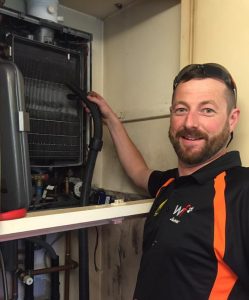Oil Boiler Installation
Surprisingly, there isn’t much difference between an oil boiler and a traditional gas boiler – and they’re not much more expensive to install either. However, there are differences in how they are run, for instance with an oil boiler you need to purchase the fuel and get it delivered to your site, as well as buying an oil storage tank to store it.
Living off the grid?
About 15% of the homes in the UK are not linked to the mains gas grid, meaning that they are dependent on either LPG or oil system boilers for heating, and whilst the government had initially planned to ban the installation of oil boilers in new homes, this has now been delayed until 2035.
What are the advantages of oil boilers?
Oil boilers act as a viable alternative for properties that are not situated close enough to a mains gas network, but this is not the only scenario in which they are advantageous. This is because oil boilers are extremely energy efficient as they only heat water on demand, rather than having a stored backlog where energy is continuously being expended heating it up. Running costs of an oil-fired boiler are typically significantly lower than electric boilers as oil is a more efficient fuel than gas, so it gives a good return on every unit of energy that is used. Finally, oil boilers provide homeowners with greater flexibility because they have the freedom to change supplier at any time, as there no contracts in place with a mains gas supplier.
How much does an oil boiler installation cost?
Whilst there are variations in oil boiler prices depending on size and quality, the cost of a new oil boiler including installation costs is typically around £3,400 – £4,500 for an internal combi boiler and around £2,500 to £4000 for an internal heat-only boiler. If you require an old oil boiler replacement as part of the service, this is likely to increase the overall cost.
Who can install an oil boiler?
Plumbers cannot complete oil boiler installations by default as specific qualifications and specialist training are required to ensure that the job is done properly. This includes OFTEC registration which stands for Oil Firing Technical Association and has the purpose of accrediting the oil boiler installers that are deemed competent enough to install oil boilers as well as being approved to install, solid fuel, and renewable heating equipment.
How do oil boilers work?
The principles of oil boilers and gas boilers are the same in that both use fuel to create hot water which is then distributed to the central heating system around the house to create warmth. This is done either from the mains in oil combi boilers, or from a cold water tank in a conventional system. The same hot water is also supplied to the hot water taps around the house as well as radiators and showers.
What are the differences between an oil boiler and a gas boiler?
The main difference between oil and gas boilers is the nature of the fuel used. Instead of being connected to a gas supply, with oil-fired boilers, it is connected to an oil tank where the oil supply is stored until it is needed. Heating oil also burns at a much higher temperature than natural gas, meaning your boiler will use less oil to produce as much heat as a gas boiler. As a result, your oil boiler will heat up your home more quickly. Heating oil also does not produce any carbon monoxide so there’s no risk of carbon monoxide poisoning with oil boiler installations.
Different types of oil boilers
There are some variations in oil boilers and when getting a new one installed, various factors need to be considered. Firstly, how busy is your home, therefore, how much heating and hot water will you require and what size oil boiler have you currently got. Owners of large properties with multiple inhabitants, bedrooms, and bathrooms will require a different oil boiler fitted compared to somebody living on their own or in a small flat.
Oil Combi Boilers
Oil combi boilers are the go-to option for smaller homes that require an oil boiler for heating. They work by warming up cold water from the mains as soon as it is needed either through the shower or hot water tap in the bathroom or kitchen. With an oil combi boiler, there is no need for hot water to be stored in a hot water cylinder as the hot water needed for the central heating system is drawn on demand. This means that oil combi boilers are efficient in terms of cost and the space required for installation
System Oil Boilers
System oil boilers are ideal for medium-sized properties as they will heat and store water in a tank so can provide more hot water in the same amount of time compared to oil combi boilers. The main difference with an oil system boiler however is that they are not vented meaning most of the components such as the pumps and valves are integrated within rather than situated externally.
Regular Oil Boilers
Regular oil boilers have been the most popular boiler choice for years. Traditionally found in larger, older properties, recent regulation changes mean that they can still be installed in new properties or as replacement oil boilers in existing properties. Their double water tank setup means that they can meet the needs of the biggest and busiest households and they are considered to be the most reliable type of oil boiler meaning you can expect an extended lifespan on your central heating system
Contact Woolfoot Heating for an Oil Boiler Installation quote today!


